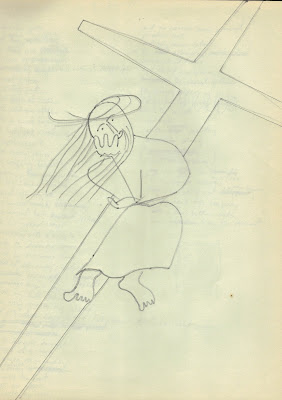XThe following was composed some years ago. It still seems to work:
In the land of the lucky we specialize in irony. The words
Father and sky are linked by legerdemain. Skilled engravers
Etch shamanistic totems on the currency. We need to be seen.
It is not understood how these things are related.
In fine weather we circulate mainly by night. Heedful to
Whom we criticize necessity, we gather around tables in
Subterranean settings to share emphatic liquids, safe
Beneath the great spiked shell of the overhead city.
We scissor between tables, or sit in the din with the
Warm weight of opinion pressed upon our thighs like the
Unwelcomed cat of an arbitrary host. What the mind cannot
Contain, the flesh must often assume. We need to be heard.
Lips sphincter on eggs of darkness. Hands flutter urgently
Like doves snared in a fog. Eyes strobe the pounding ether
For omens of potentiality. Foiled by the tyranny of
Triangulation, do we still hope to be touched?
Boney-fingered dawn now prods a commotion of public events.
We note that the statues on the commons have ceased bellowing.
We hunker close in the deep purple dust of dead presidents
To attend their muttered contempt for the styles of the faithful.
We need to act. Here a committee is formed to oppose a task
Force. There a cetacean is rescued from stardom. All
Future walls must be clearly labeled BIODEGRADABLE. The
Think tank across the river hums like a Tibetan revival tent.
Vouchers for tennis lessons are distributed to the indigent.
The Joint Chiefs of Staff declare a moratorium on the production of
Blues harps. Bumper stickers are found to be edible and the
Parking lots double-up on muscle. Disney annexes Havana.
Weary, rosy, we now trudge our way westward. The
Dying orphans of High Romance are with us yet. We step around.
A large yellow dog of which Dickens dared not to conceive
Makes meat in the gutter of our national thrift.
We need to be seen. We need to be heard. Do we hope to be
Touched? We need to act. It is not understood how these
Things are related. The dog makes meat. The statues are silent.
This latter we take as a sure sign of progress.
X










